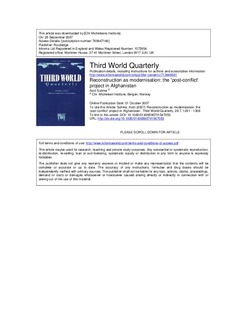| dc.contributor.author | Suhrke, Astri | |
| dc.date.accessioned | 2018-01-04T08:21:33Z | |
| dc.date.available | 2018-01-04T08:21:33Z | |
| dc.date.issued | 2007-09-01 | |
| dc.identifier | oai:www.cmi.no:2742 | |
| dc.identifier.citation | in Third World Quarterly vol. 28 no. 7 pp. 1291-1308 | |
| dc.identifier.uri | http://hdl.handle.net/11250/2475217 | |
| dc.description.abstract | This paper examines the post-war reconstruction programme in Afghanistan, arguing that it contains the seeds of radical social change. The paper analyses the tensions of the present reconstruction project in light of the past experience of similar programmes launched by Afghan rulers and their foreign supporters. The central argument is that the conflation of post-war reconstruction with a broader agenda for development and modernisation has brought out a wide range of tensions associated with social change. Simultaneously the prominent foreign role in the undertaking has increasingly had negative effects. As a result, the entire project shows signs of severe contradictions that are adding to the problems caused by the growing insurgency. | |
| dc.language.iso | eng | |
| dc.relation | Third World Quarterly | |
| dc.relation | 7 | |
| dc.relation.ispartof | Third World Quarterly | |
| dc.relation.ispartofseries | Third World Quarterly vol. 28 no. 7 | |
| dc.relation.uri | https://www.cmi.no/publications/2742-reconstruction-as-modernisation | |
| dc.subject | Post-War Reconstruction | |
| dc.subject | Afghanistan | |
| dc.title | Reconstruction as Modernisation: The 'post-conflict' project in Afghanistan | |
| dc.type | Journal article | |
| dc.type | Peer reviewed | |
| dc.identifier.doi | 10.1080/01436590701547053 | |
